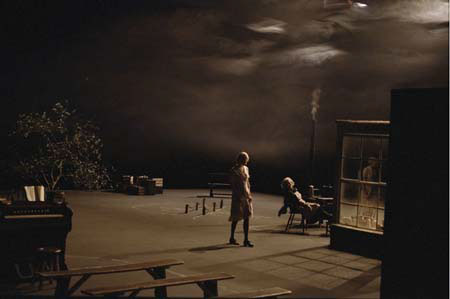"Nobody Gonna Sleep Here, Tonight"

I recently rewatched Dogville because of the impending release of Manderlay next month. Let me just say, it is a damn fine film. From the offset, Dogville presents the viewer with an environment that cannot be taken for granted. Dogville's famous soundstage makes the town a parable, but what's more, creates what is perhaps the greatest meta-cinematic construction ever presented on the silver screen. At no point in the film do you take Dogville for a real town. How could you? Likewise, the characters become types rather than characters proper. Von Trier's near perfect screenplay is taut, searing and witty (admittedly, at times, too witty). Dogville is also a Godless town in perpetual wait for the minister that they know will never arrive. Instead they have Tom, the local "philosopher," who is too busy in thought to have ever written more than two words. In the opening of the film, Tom lectures about the latent evils in Dogville - a side that the town has yet to expose. But his arguments are weak and it is, of course, he who later proves to be the one most severely displaying the perils against which he preaches. In assuredly the best performance any director will ever wring from Ms. Kidman, Grace is an ever-optimist and perhaps Von Trier's greatest achievement here is eventually convincing the viewer that the martyrical stance that Grace takes is, in itself, arrogant. By placing herself above these people, she can only labor under the whim of their self-serving intentions. In seeming selfless, she invents a paradigm in which the villagers can only find advantage in her offerings and eventually (morally) fail because of this.
Dogville is, to Grace, but a trinket in a window. A gaudy plaster figurine: glazed, idyll and patient. It is fitting then, that Grace meets her breaking point when these figures are smashed to the ground by the very town that they resemble to her.
I don't know how I missed it when I saw Dogville in theaters, but at one point, Von Trier informs the viewer precisely how the film will end. Since the film is based around Brechtian theatrical(in both spatial and formal) structures, during one of the more menial chores she is forced to do (this is only after Von Trier has near broken Grace with 2+ hours of selfless indignation), she utters a line penned by Brecht and his musical counterpart, Kurt Weil. It is remotely inconspicuous, though Von Trier makes certain to highlight it with special care in the narration. As Grace removes a soiled sheet for cleaning, she mutters the line, "Nobody Gonna Sleep Here, tonight." It takes her completely by surprise, yet the knowing viewer should recognize this from the Weil song 'Pirate Jenny.' The songs is a tale of a maid who dreams of the day her black pirate ship will come sailing in and she will kill everyone who ever did her wrong. "They pile up the bodies and I'll say, 'That'll learn ya!'"
And pile up the bodies she does, as the people of Dogville have used Grace beyond her purpose, and what's worse, by this point she has highlighted all of the towns hypocrisies - especially, in a strikingly poignant scene, making Tom realize the fault in his own convictions, they turn her in. And this is truly the turning point that makes Dogville a far superior film to anything Von Trier has released thus far. For when They ("the ship, the black freighter" now a band of thirties automobiles) arrive to take Grace away, the film embarks on a philosophical endeavor concerning the personal trappings of man. They, end up being Grace's father and his band of gangster thugs. Grace relents, for what could be worse than the township of Dogville(?), and she enters the car in which her father waits. The moment inside the car (and it is brief) is the only moment of traditional cinematic delivery that Von Trier allows the viewer, and even so, the dialogue is heavy with a purpose that transcends mere familiar conversation. Who is in fact speaking is open to interpretation. I firmly believe that here Grace is meant to represent Jesus and her father (perfectly played by James Cannes), God. They discuss man as if they were apart from him. It is their damning hand that will destroy this township in a barrage of bullets and fire. You see it coming. Von Trier makes you want it to come. When the gangsters gun down the children, Von Trier forces a nasty and redemptive smile to creep across our faces. "If there's a town the world could do without," Grace decides, "this is it."
Jast as a little addendum, if anyone would like to read Scott Foundas' bitch slap to Herr. Ebert, you can go here to LA Weekly's new-yet-not-that-all-together website.

2 Comments:
The ridiculous Tom character in Dogville for some reason just made me think of the hilarious Tom character in Altman's 3 Women.
Dogville truly is one of the great comedies of the new millenium. The murdering of the children appeals to the deepest, most fueled hatred within yourself... and Grace's repeating of the line, in reference to the Patricia Clarkson character, "Do the kids and make the mother watch. Tell her you'll stop if she can hold her tears back. I owe her that," really gave me one of the most sinister laughs I've had in a long time. While I firmly agree with just about all you had to say -- I think you're giving Kidman too much credit. She seems in a daze the whole film. Van Sant used her best in "To Die For."
Post a Comment
<< Home